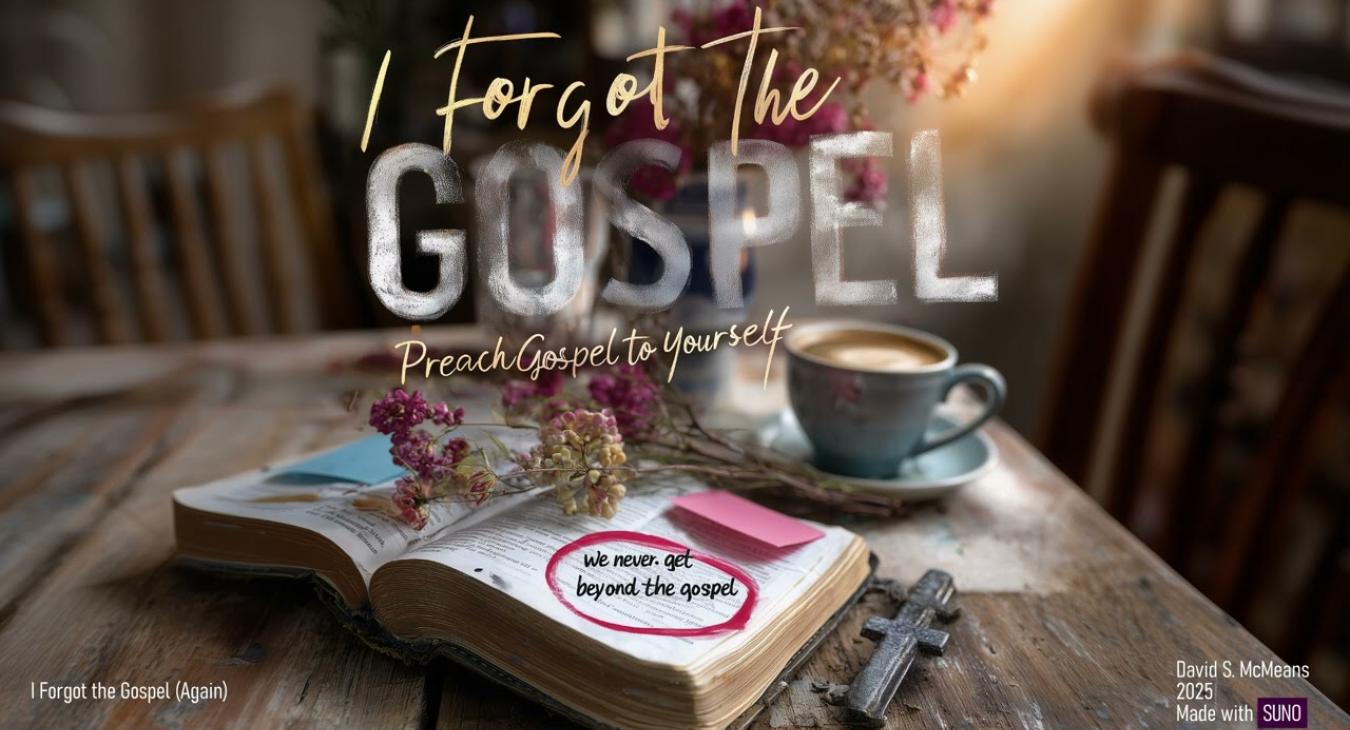A playful yet profound folk-gospel song about how our biggest spiritual problem is forgetting the gospel—and how God keeps reminding us through grace, community, and His Word.
"I Forgot the Gospel (Again)" explores the often-overlooked truth that the greatest challenge in the Christian life is not rebellion, but forgetfulness. With a tone that is both humorous and heartfelt, it traces the daily struggles of a believer who drifts into performance, self-reliance, or despair—only to be drawn back by the repeated reminders of grace. Through playful lyrics and gospel-rich choruses, the song encourages believers to preach the gospel to themselves, lean into community, and embrace the gift of being reminded again and again that their identity and worth rest not in their performance, but in Christ.
Lyrics
Verse 1
I woke up this morning with a list in my hand
Things to prove, rules to follow, a performance plan
I thought God might like me if I worked real hard
'Til I tripped on my pride and fell face down in the yard
I forgot the cross, I forgot the grace
I forgot that I don’t have to win the race
I looked in the mirror and tried to pretend
But there it was again—
I forgot the gospel… again
Chorus
Tell me again what I keep misplacing
(You’re loved, you’re free—stop all your chasing!)
Remind me why I don’t need to strive
(He died and rose—you’re already alive!)
I need more than will—I need truth that won't bend
(So preach it, repeat it, remember it, friend!)
I forgot the gospel… again
Verse 2
I scrolled through my phone, felt empty inside
Thought maybe success would give me a ride
Tried to earn worth with my status and pace
'Til I read in the Word: I’ve already got grace
My soul’s like a sieve, it leaks out the good
So I show up to church like I know I should
Where the preacher says what I knew back then:
You forgot the gospel… again
Chorus
Tell me again what I keep misplacing
(You’re loved, you’re free—stop all your chasing!)
Remind me why I don’t need to strive
(He died and rose—you’re already alive!)
I need more than will—I need truth that won't bend
(So preach it, repeat it, remember it, friend!)
I forgot the gospel… again
Bridge
The preacher said, “We never get beyond the gospel,
only deeper into it.”
So preach it to yourself in the morning light,
Let your community speak what’s right,
Let the pulpit remind you for the thousandth time—
Your debt is paid, your life is not on the line.
Final Chorus
I forgot, but He remembered me
(His love’s the anchor, His truth the key)
When my heart goes blind, when my mind won’t mend
(The Spirit sings softly… again and again)
I forgot the gospel… again
But He won’t let me forget in the end
I forgot the gospel… again
Devotional Series: “Never Forget: Rooted in Grace, Growing in Christ”
A 5+1 Day Study of 2 Peter 1:1–15 through Tim Keller’s Gospel Lens
Day 1: Grace Comes First
Passage: 2 Peter 1:1–4
Big Idea: God’s power, not our performance, is the foundation of the Christian life.
Devotional:
Before Peter urges believers to grow in virtue, he reminds them that everything they need for life and godliness has already been given through God’s divine power. This isn’t just spiritual equipment—it’s a new identity, rooted in Christ. Notice Peter doesn’t say, “If you try hard enough, you might earn a place in God’s family.” Instead, he opens with “To those who have obtained a faith of equal standing.” Grace is the starting line.
Tim Keller often reminded his listeners: the gospel is not the ABCs of the Christian life but the A to Z. You don’t graduate from grace. In fact, real transformation begins when you see that you're already loved and secure. The more deeply you know Christ—the more you dwell on His promises—the more you become like Him. It’s not our effort that produces godliness, but our connection to the source of divine power.
This grace-first foundation keeps us from falling into legalism (trying to earn favor) or despair (believing we’ll never change). Everything else Peter says is built on this truth: God has already acted, already provided, already made a way. The Christian life is lived in response.
Thoughts to Consider:
Do you live as though you’re trying to achieve God’s favor—or as someone who’s already received it?
What does it mean to “participate in the divine nature”? How is this more than behavior modification?
Questions for Individual Study:
Where in your life are you forgetting that grace comes first?
What promise of God do you most need to hold onto today?
Group Discussion:
How have you seen grace change someone over time?
Why is it so easy to reverse the order and put performance before grace?
Day 2: Growth as Response
Passage: 2 Peter 1:5–7
Big Idea: Spiritual growth is not the root of salvation—it’s the fruit.
Devotional:
Peter says, “For this very reason”—what reason? Because of what God has already done—“make every effort to add to your faith…” The Christian life is not passive. But the effort comes after the foundation is laid. That order is everything.
Tim Keller would describe this as grace-driven effort. You’re not climbing a moral ladder to reach God. You’re learning to walk now that you’ve been carried into the kingdom. The list Peter gives isn’t a legalistic checklist but a portrait of Christ being formed in us. Virtue, knowledge, self-control—these aren’t burdens, but signposts that the Spirit is working in us.
If you belong to Christ, then growth is natural—but not automatic. Like a garden, it needs attention. It’s slow. But it’s alive. The call is to cooperate with grace, not to compete for worth.
Thoughts to Consider:
Are you pursuing growth as a response to grace—or to earn something from God?
How do these qualities point us back to Jesus?
Questions for Individual Study:
Which of these virtues feels most present in your life right now? Which feels absent?
How can you intentionally pursue “grace-driven effort” this week?
Group Discussion:
What’s the difference between legalism and grace-fueled discipline?
How does growth in character reveal Christ’s presence in us?
Day 3: The Danger of Forgetfulness
Passage: 2 Peter 1:8–9
Big Idea: Our biggest spiritual problem isn’t rebellion—it’s forgetfulness.
Devotional:
Peter’s warning is striking: if you lack these qualities, you’re “nearsighted and blind,” having forgotten that you were cleansed. He’s not talking about outsiders. He’s warning believers. And he says the root issue is not lack of trying—it’s spiritual amnesia.
Keller often said the human heart is like a leaky bucket. We don’t just need to hear the gospel once; we need to hear it daily. Preaching the gospel to ourselves is not optional—it’s survival. When we forget grace, we drift into self-reliance, pride, fear, or despair. When we remember grace, we walk in freedom.
Forgetfulness isn’t innocent—it’s dangerous. It blinds us to who we are. That’s why reminders matter. Teaching, preaching, small groups, daily habits—all exist not to give us something new, but to anchor us in what’s true.
Thoughts to Consider:
What habits help you remember the gospel daily?
Where are you most likely to slip into spiritual forgetfulness?
Questions for Individual Study:
Have you ever realized you were living out of “forgetfulness”?
What truth about your identity in Christ have you forgotten recently?
Group Discussion:
What does spiritual forgetfulness look like in real life?
How can we help each other remember what’s true?
Day 4: Assurance Through Change
Passage: 2 Peter 1:10–11
Big Idea: Spiritual growth confirms our identity, not the other way around.
Devotional:
Peter urges believers to “make your calling and election sure.” He doesn’t mean we earn salvation through good behavior. He means that our growing likeness to Christ confirms that we’ve been truly changed. Transformation gives us assurance.
Tim Keller would say that gospel fruit gives evidence of gospel root. You don’t earn sonship by acting like a child of God—but when you live like one, it reassures your heart. You start to see that the Spirit really is at work in you. Not perfectly. But genuinely.
This leads not to pride, but to joy. “There will be a rich welcome into the eternal kingdom,” Peter says. You won’t limp across the finish line wondering if you’re in. You’ll be welcomed by the One who’s been transforming you from the start.
Thoughts to Consider:
Do you look for assurance in your emotions, circumstances, or transformation?
What does it mean to pursue assurance without falling into legalism?
Questions for Individual Study:
Where have you seen God grow you over time?
How do you respond when you don’t feel spiritual progress?
Group Discussion:
How can we encourage one another’s assurance in healthy, gospel-centered ways?
What’s the difference between fruit as evidence and fruit as requirement?
Day 5: Never Stop Remembering
Passage: 2 Peter 1:12–15
Big Idea: The goal of gospel ministry is to help people remember.
Devotional:
Peter knows he’s going to die soon. And what’s his main concern? That the people he loves will remember the gospel. “I will always remind you,” he says. “I think it’s right to refresh your memory.” Even at the end of his life, Peter isn’t looking for something new—he’s reinforcing what’s already true.
Keller often described preaching not as “teaching new things” but as “reminding people of what they forget every day.” The repetition of grace is not a flaw in the system—it’s the point. We are forgetful creatures. We need rhythms, habits, and voices that bring the gospel to the surface again and again.
Peter’s legacy isn’t novelty. It’s faithful repetition. As a church, family, and community, our calling is the same: repeat the truth until it’s remembered, lived, and passed on.
Thoughts to Consider:
Who reminds you of the gospel when you forget?
How can you be a reminder to others?
Questions for Individual Study:
What spiritual truths do you need to rehearse regularly?
What legacy of gospel remembrance do you want to leave?
Group Discussion:
How does your church or community practice “gospel reminding”?
What would it look like to build gospel repetition into everyday life?
Day +1: Remember the Gospel Again
Passage: Galatians 2:20, Romans 5:8, John 15:5
Big Idea: The gospel isn’t something you move past—it’s something you grow deeper into.
Devotional:
You’ve made it through five days of studying 2 Peter, and if you take one thing with you, let it be this: remember the gospel. It’s the power for salvation, the fuel for growth, the anchor of assurance, and the song we’ll sing forever. You don’t graduate from it—you grow deeper in it.
Tim Keller often said the gospel is not just for non-Christians—it’s the daily bread of every believer. Christ died for you while you were still a sinner. You are now hidden in Him, and the life you live, you live by faith in the Son of God, who loved you and gave Himself for you.
The danger is not that we’ll stop believing the gospel—it’s that we’ll live as if we’ve forgotten it. But God, in His grace, keeps reminding us. Through His Word. Through His people. Through the Spirit. So today, take a breath. Preach the gospel to yourself. And begin again in grace.
Thoughts to Consider:
What daily reminder of the gospel will you carry forward?
What would change if you truly believed you are already loved?
Questions for Individual Study:
Where do you most need the gospel today?
How can you build gospel remembrance into your week?
Group Discussion:
What have you learned through this study?
How can we keep reminding one another of the gospel after this week ends?
Notes:
Below are additional notes for this article.
ChatGPT said:
Read more articles
- Log in to post comments


